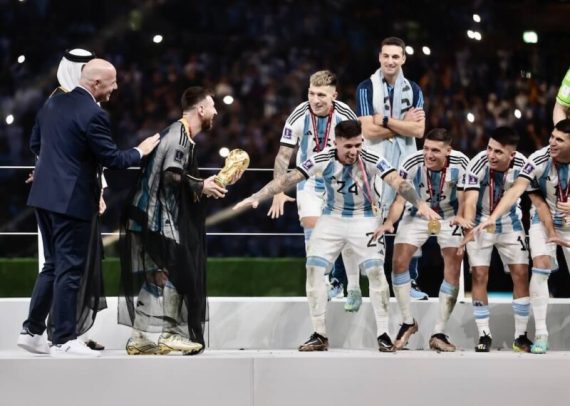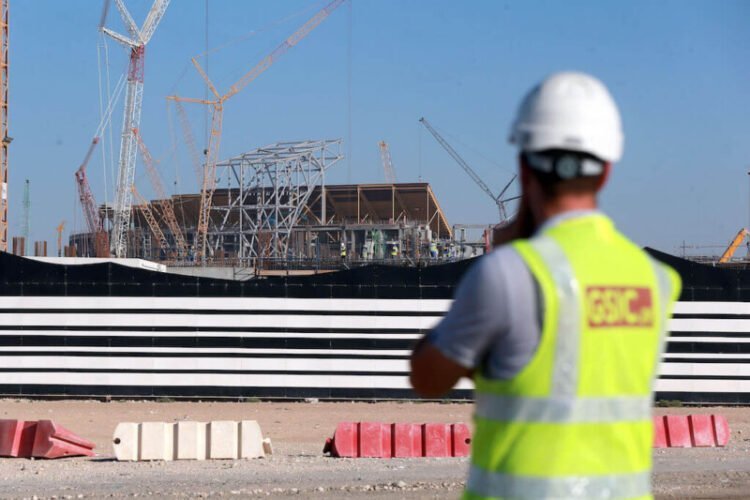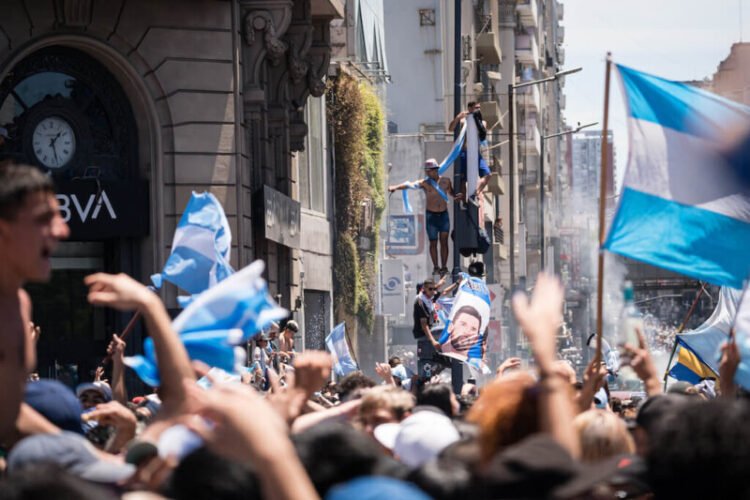T
he 2022 FIFA World Cup Qatar ended on December 18, at Lusail Stadium, north of Doha. The World Cup sparked much controversy in the international media, and seemed to represent more than just a sports tournament.
In December 2010, Qatar won the right to host the 2022 World Cup after a vote at FIFA headquarters in Zurich, becoming the first Arab and Middle Eastern country to host this world championship.
Since then, many doubts were raised about Qatar’s legitimacy to host the tournament.
First, Qatar was accused of paying bribes to FIFA officials in order to obtain the right to host the World Cup.
Several questions were raised about the ability of Qatar to host such a big event; the readiness of stadiums and sports infrastructure being among the most serious ones. Possible health risks that players may be exposed to due to the weather conditions in Qatar also became a topic of discussion.
However, such controversies did not prevent Qatar from completing all preparations for the World Cup. Then, suspicions shifted from logistical readiness to accusations of violating human rights and lack of freedoms.
From the beginning of the World Cup on November 20 to the final game on December 18, Qatar’s World Cup stadiums became a platform for political and, sometimes, cultural messages.
Human rights in the construction sector
Among all the accusations leveled against Qatar, the issue pertaining to the rights of migrant workers was the most controversial and widespread with several reports and investigations published on it.
In 2013, The Guardian published an investigation indicating such violations. The investigation claimed, “Dozens of Nepalese migrant laborers have died in Qatar in recent weeks and thousands more are enduring appalling labor abuses.” The report indicated that, according to documents obtained from the Nepalese embassy in Doha, at least 44 workers died between June 4 and August 8. More than half died of heart attacks, heart failure, or workplace accidents.
In addition, the newspaper described the working and living conditions faced by the workers as “slavery in modern times.” The investigation spoke of very harsh working conditions. For example, the report referred to “forced labor on a huge World Cup infrastructure project.” Moreover, some Nepalese men alleged that they had not been paid for months while according to the same investigation, others said employers routinely confiscate passports and refuse to issue ID cards.
In 2016, Amnesty International reported that migrant workers were exploited at a Qatar World Cup 2022 site. The report claimed that “migrant workers on Khalifa International Stadium and the surrounding Aspire Zone have been subjected to a range of exploitative practices.” These practices included high recruitment fees, false promises about pay, passport confiscation, dirty and cramped accommodation, and threats over complaining about their conditions.
After the publication of these two reports, as well as other investigations, Qatar was forced to take appropriate measures. According to Al-Jazeera, the Qatari government introduced changes to the labor law. In a statement, Issa al-Nuaimi, the Qatari labor minister, stated, “The new law is the latest step towards improving and protecting the rights of every expatriate worker in Qatar.”
On October 16, 2019, the Qatari Government Communications Office published a statement announcing the endorsement of new labor laws in order to improve conditions for workers. The new law gave workers the right to change employers freely, unlike what was prevalent within the so-called kafala system. In addition, it “allowed almost all migrant workers in Qatar to leave the country without first obtaining permission from their employers.”
In this context, the International Labor Organization said it “welcomes these reforms and recognizes the commitment of the State of Qatar to transforming its labor market.” The organization also claimed that these steps “mark the end of kafala in the country.”
Despite all Qatar’s attempts to reform its labor law, the human rights battle never subsided. Human Rights Watch and Amnesty International published reports on continued violations of workers’ rights in Qatar on August 24 and November 16, 2022, respectively.
On December 12, 24 workers participated in an exhibition match with football legends on the sidelines of the World Cup at Al Thumama Stadium in Doha. “The workers had been part of projects related to the eight state-of-the-art stadiums and 42 training sites and were selected based on their passion for football,” FIFA stated.
FIFA president Gianni Infantino refereed about 10 minutes of the match. “Let’s hope for a great evening of football, just as we have seen a great World Cup so far,” Infantino said before the kickoff. Again, he stressed that “football unites the world.”
Traditional values and conservative culture
The World Cup organizers expected that at least one million people would visit Qatar during the World Cup period. FIFA stated that “more than 1.2 million tickets have been requested by fans worldwide in the first 24 hours of the initial sales period.”
Questions were then asked along the lines of how such a small country with a conservative culture can receive such number of visitors.
Alcohol consumption in Qatar is not completely prohibited, but is allowed only in licensed restaurants and bars. Moreover, the legal drinking age is 21.
Two days before the start of the World Cup, FIFA announced that “a decision has been made to focus the sale of alcoholic beverages at the FIFA Fan Festival, other fan destinations, and licensed venues.”
In remarks to BBC Sport, the tournament’s chief organizer, Nasser Al-Khater, confirmed that alcohol will be served “in select areas within stadiums.”
Indeed, alcohol was available in the fan zone and selected areas. Moreover, the Arcadia Music Festival, which offered “the most immersive shows on Earth” and a capacity of 1,500 spectators, offered alcohol between 10 a.m. to 5 p.m. every day.
One of the key accusations/criticisms leveled against the Qatar World Cup 2022 was the presence of gay fans. Although homosexuality is illegal in Qatar, CEO Nasser Al Khater said to Sky News that “gay fans will be welcome to display affection and rainbow flags.”
Moreover, in a speech to the United Nations General Assembly, the Emir of Qatar Sheikh Tamim bin Hamad Al Thani stated that “Qatari people will welcome football fans from all walks of life with open arms.” The emir confirmed that Qatar will open its doors to all fans without “discrimination.”
Despite this, the players could not wear the OneLove armband and fans weren’t allowed to fly rainbow flags.
The Football Association of Wales (FAW) stated that they “were extremely disappointed by reports that members of Y Wal Goch, (a s pre-match song and fan club about the survival of Welsh culture and language), which included FAW staff members, were asked to remove and discard their Rainbow Wall bucket hats before entry to the Ahmad Bin Ali Stadium.”
In the same context, the England Football Association noted that “FIFA has been very clear that it will impose sporting sanctions if our captains wear the armbands on the field of play.” The statement by Germany’s players was the most controversial and widespread. In their opener against Japan, they covered their mouth with their hands; denying them their right to wear the LGBT support armband was like muting their voices, a statement by the German Football Association (DFB) noted.
During the World Cup, the Moroccan national team’s qualification came as a big surprise. Morocco was the first Arab and African team to reach the World Cup semifinals.
After the Moroccan team’s victory over Spain in the 16th round and Portugal in the quarterfinals, some Moroccan players raised their index fingers towards the sky, an action that sparked a lot of reaction in international media.
German news channel Welt accused the Moroccan national team players of using the “Islamic State (ISIS) signal” by raising their index finger after their victory over Portugal. This link between the celebration of three Moroccan players and ISIS caused great discontent in the Arab and Muslim worlds, as Muslims use this gesture to express thanks to God.
Germany-based U.S. journalist Hebh Jamal described calling the players terrorists a “hate crime.” She posted pictures of Argentinian Lionel Messi and Brazilian Neymar Júnior raising their fingers to celebrate scoring, and sarcastically wrote, “Messi is an Islamic state terrorist” and “Neymar is a terrorist too.”
The Moroccan players’ mothers stole the limelight at the World Cup. Pictures spread of Moroccan players celebrating and dancing with their mothers after winning every match, and kissing their foreheads.
According to Al-Jazeera, team coach Walid Regragui and Royal Moroccan Football Federation President Fouzi Lekjaa had ensured that the family members chosen by the players were offered an all-inclusive trip to Qatar.
“Our success is not possible without our parents’ happiness,” Regragui, who also celebrated with his mom, said upon taking the job in August.
The last issue that raised criticism was the emir of Qatar giving the traditional Arab Gulf bisht to Argentina captain Lionel Messi to wear while lifting the World Cup trophy after defeating France in the final match.
The Arab uniform, primarily worn in the Gulf is “a long cloak made out of light, often sheer, material with trimming made out of real gold that is worn over a white thobe,” according to Al Jazeera.
Al Jazeera claimed that the bisht is typically worn by top officials such as politicians, sheikhs, and other high-status individuals, and that for Qataris and Arabs, its placement on Messi’s shoulders by Sheikh Tamim bin Hamad Al Thani was a way of honoring him.
Messi shared a photo wearing the bisht while smiling and lifting the trophy on his personal social media accounts. The official account of the Argentina national football team posted a picture showing the emir of Qatar placing the bisht over Messi’s shoulders and wrote “¡Claro, Rey!” (Sure, King!)
However, certain Western media outlets interpreted this action in a different way. The Daily Mail considered it a “selfish moment” because the emir “forced” Messi to cover up his iconic No.10 shirt with the traditional Arab robe.
“Lionel Messi endured an awkward moment after Argentina’s World Cup win on Sunday as he was draped in a robe ahead of the trophy lift,” the Daily Mail claimed. The Telegraph went further and described it as a “bizarre act that ruined the greatest moment in World Cup history.”
These interpretations were considered by many as a form of Islamophobia and manifestations of Western media’s racist attitudes towards Qatar, especially given the history of such media platforms in criticizing the Gulf country.
Sport tournaments are also political
Despite many calls for a separation between sports and politics, Qatari stadiums could not remain untouched by ongoing political conflicts across the world.
On February 28, 2022, FIFA decided that “Russian teams, whether national representative teams or club teams, shall be suspended from participation in both FIFA and UEFA competitions until further notice.” FIFA’s decision came in solidarity with Ukraine following the Russian invasion.
In this context, Poland captain Robert Lewandowski received a Ukrainian armband from Andriy Shevchenko, former Ukraine captain, to wear at the World Cup.
In addition, eight teams that had qualified for the World Cup 2022 announced their participation in the OneLove campaign, which was initially started by the Dutch Football Association. This campaign called for captains to wear the OneLove armband in Qatar. The England Football Association stated that the OneLove campaign will use the power of football to promote inclusion and send a message against discrimination of any kind.
On the other hand, activists on social media called on qualified Arab teams, Morocco, Tunisia, Saudi Arabia, and Qatar, to wear armbands in support of Palestine. This campaign came as a response to Lewandowski’s announcement of wearing the Ukraine armband and English captain Harry Kane wearing the OneLove armband.
Iran was also present on the political side of the World Cup 2022. The Ukrainian Association of Football (UAF) made a request to FIFA to “consider excluding the Iranian national team from the 2022 FIFA World Cup.” The UAF request was based on “media information about systematic human rights violations” and “possible involvement of Iran in the military aggression of Russia against Ukraine.”
In their first World Cup match against England, the Iranian players didn’t sing the national anthem. Many onlookers explained this action as “an apparent gesture of solidarity with anti-government protesters in the Islamic republic.” However, the players ended their silence and sang the anthem before the start of the second match against Wales.
Several media platforms accused the Iranian government of putting pressure on the players to recite the national anthem in the second match, which Iran denied.
It is noteworthy that the supporters of the protests did not support the Iranian national football team, known also as “Team Melli,” even after they refrained from singing the national anthem in the first match. Before travelling to Doha on Monday, November 14, Team Melli players had met Iranian President Ebrahim Raisi in his office in downtown Tehran.
The most prominent political gesture in the World Cup was the solidarity with the Palestinian cause and the rejection of Israeli journalists in Qatar, especially by Arab fans.
Solidarity with Palestinians was expressed by carrying Palestinian flags inside the stadiums and in the streets. The phrase “Free Palestine” was written on Palestine flags across Qatari stadiums, especially during the Arab teams’ matches.
“Seeing the Palestinian armbands and bracelets, and hearing the “free Palestine” chants in the stadiums, fan zones, in the streets, and on social media, one may think that Palestine is among the 32 countries whose teams have participated in this World Cup,” Dima Khatib, managing director of AJ+ Channels, reported.
Israeli journalists, who came to cover the World Cup, were not welcome both in front and behind the cameras. On the contrary, they were ignored and protested by the public.
Israeli journalists, who came to cover the World Cup, were not welcome both in front and behind the cameras. On the contrary, they were ignored and protested by the public.
Raz Shechnik, an Israeli journalist who went to Qatar to cover the World Cup, expressed his annoyance at the fans’ behavior towards him. After ten days he spent in Doha, Shechnik felt “hated…and unwanted.”
Following hostile looks from Muslims and Arabs, especially “Palestinians, Iranians, Qataris, Moroccans, Jordanians, Syrians, and Egyptians,” Shechnik decided to identify himself as Ecuadorian.
Shechnik claimed that he was physically confronted by Palestinians. After a particular match of Brazil, Palestinians stood around him with flags, shouting and harassing him. “They want to wipe us off the face of the Earth. Everything related to Israel arouses intense hatred in them,” Shechnik stated.
“On one occasion, a fan from Kfar Qasim who dared to come and be interviewed was even surrounded in a threatening manner. He turned white-faced in a second. In this whole situation Palestinians or Qataris stood and took pictures to make fun of us,” he added.
Morocco team players raised the Palestinian flag after reaching the quarterfinals. In an article entitled “Morocco Is Not in Palestine,” the German newspaper Die Tageszeitung (Taz) considered waving the Palestinian flag “an anti-Semitic touch” that seemed “childishly defiant.”
Moreover, the article noted the solidarity of the Arab teams with Palestine. It indicated that “Tunisian fans did something similar in the preliminary round.” In addition, the article claimed, Qataris wore a “pro-Palestine” armband in response to the Europeans’ One Love armband to “assert alleged Arab unity.”
Recommended
Smear campaigns against Qatar
Several Qatari officials believe that their country was subjected to deliberate smear campaigns.
The Emir of Qatar Sheikh Tamim bin Hamad Al Thani stated, “Since we won the honor of hosting the World Cup, Qatar has been subjected to an unprecedented campaign that no host country has ever faced.”
Before the official kickoff, an infographic asking visitors at the World Cup to commit to a set of rules was widely circulated on social media. The rules were related to personal behaviors such as drinking alcohol, dress, and homosexuality. The infographic received a lot of online attention until Qatar issued a statement denying its credibility. “The ‘Qatar Welcomes You’ graphic circulating on social media is not from an official source and contains factually incorrect information,” the Qatari Supreme Committee for Delivery & Legacy stated on Twitter.
Apart from Qatar officials, during a speech, FIFA President Gianni Infantino stated, “What we Europeans have been doing for the last 3,000 years, we should be apologizing for the next 3,000 years before starting to give moral lessons.”
“I think if for three hours a day you can’t drink a beer, you will survive because actually the same rules apply in France, in Spain, in Portugal, in Scotland, where no beer is allowed in stadiums. Now, here it seems to become a big thing because it’s a Muslim country,” said Infantino highlighting an evident hypocrisy targeting Qatar.After the final game, Infantino stated that the Qatar World Cup was the “best World Cup ever.”
He thanked Qatar for being a fantastic and incredible host. “Congratulations to Qatar. What you have done to welcome the world into this beautiful country has been unbelievable, and everyone felt at home,” Infantino said.Days before the beginning of the World Cup, French President Emmanuel Macron stated that “sport shouldn’t be politicized.” Indeed, Macron praised the distinguished efforts made by Qatar to make the World Cup a success. This came in a series of tweets he posted in Arabic on his Twitter account, after the French national team qualified for the 16th round. Macron attended the semifinals and the final match in Qatar.







